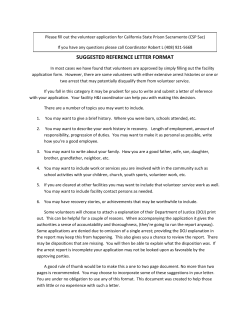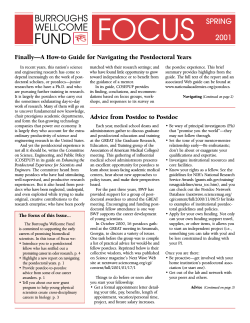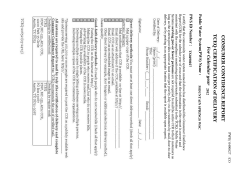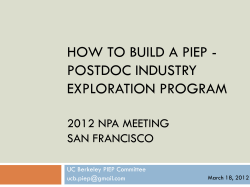
I yyyy ffff
N C I Center for Cancer Research f ELLOWS & yOUNG I NVESTIGATORS NEWSLETTER Volume 1 Issue 3 September 2002 From the Editor s Desk: Welcome to the third issue of the CCR-FYI newsletter! In this issue, you will find an article on the development of a National Postdoc Association as well as articles on the Office of the Ombudsman, Immigration Policy, the Breast Cancer Faculty, Mentoring at NIH, Writing a Paper, The Biologist Network, and Technology Transfer Training. Don t forget to check out the Announcements at the end — there are some great events occurring on all NIH campuses! Catherine L. Neary, Ph.D. The Next Step in Improving the Postdoctoral Experience Despite the importance of postdocs to the research enterprise, it is widely acknowledged that this class of scientists is in an especially vulnerable position. Not graduate students, not faculty members, and not staff scientists, postdocs have so far slipped between the cracks of the recognized workforce of the scientific community. Currently a heterogeneous group of poorly defined apprentice scientists, postdocs generally do not have welldefined expectations of employment; appropriate employment rights and responsibilities; commensurate or even normalized pay scales; regular performance evaluations; employment benefits such as comprehensive health care, pensions, disability, or parental leave; or grievance procedures. These are issues that postdocs nationwide are dealing with and are not specific to any one institution. The need for improved conditions for postdoctoral scientists is recognized by the US government, funding agencies, universities, research institutions, professional organizations and postdocs themselves (AAU Report, 1998; University of California Council of Graduate Deans Report, 1998; FASEB, 2001). Postdocs are central to this nation’s global leadership in science and engineering. It is largely they who carry out the sometimes exhilarating, sometimes tedious day-to-day work of research. It is largely they who account for the extraordinary productivity of science and engineering research in the United States." (COSEPUP Guide, 2000 http://www7.nationalacademies.org/postdoc/). Representatives from postdoc associations from across the US discussed the need for a national postdoc organization at the 2nd National Postdoc Network meeting in April 2002. Following the meeting, several postdoc representatives have worked with the Postdoc Network (http://nextwave.sciencemag.org/pdn) to form a committee to explore the idea of a National Postdoc Association. The Alfred P. Sloan Foundation funded a planning meeting in Washington DC on 3-4 September, 2002. We received overwhelming support from people at AAAS and feel confident about the tasks we are have set to accomplish for the postdocs training in the United States. Aims of the National Postdoc Association (NPA): • To provide a focal point for the expression of the views and needs of postdoctoral scientists at national, regional and institutional levels in matters concerning postdocs. • To facilitate the establishment of best practice polices for the postdoctoral training and work environment, and to encourage their implementation by institutions and postdocs. • To provide support to existing institutional postdoctoral associations as well as aid in the establishment of new postdoctoral associations at institutions that currently have no such association. • To enter into meaningful dialogue with the appropriate institutional representatives, funding agencies, professional organizations, and government bodies to identify solutions and bring about improvements in the current postdoctoral situation at the national level. Local postdoctoral associations (PDAs), such as the CCRFYI are vital precursors to and partners with the proposed National Postdoc Association. Many PDAs have been able to work with the administration at their institutions to implement needed policy changes. The CCR has gone to great lengths to improve the situation for postdocs, by implementing uniform pay scales, and providing health benefits. However, some issues require Providing support for fellows at CCR CCR-FYI Association is supported by the CCR Office of the Director P N C I Center for Cancer Research f ELLOWS & yOUNG I NVESTIGATORS NEWSLETTER Volume 1 Issue 3 policy attention at the national level. The proposed National Postdoc Association will collaborate with local organizations to collect data on the postdoctoral experience and work for national policy changes that will benefit all postdocs--and consequently benefit all parties interested in improving the scientific enterprise. For more information on NPA activities and volunteer opportunities, contact the NPA steering committee at Steering@nationalpostdoc.org or check out our web site at http://www.nationalpostdoc.org/ Claudina Aleman Stevenson, NCI Arti Patel, NCI Orfeu Buxton, U. of Chicago Avi Spier, Scripps Karen Christopherson, Stanford Carol Maneham, Johns Hopkins On behalf of the The National Postdoc Association The NIH Center for Conflict Resolution Yes, there are two CCRs at NIH — our own beloved Center for Cancer Research, and the Center for Conflict Resolution, also known as the Office of the Ombudsman. According to their website (http://www4.od.nih.gov/ccr/), The NIH Office of the Ombudsman, Center for Cooperative Resolution (CCR) was established in 1997 to provide the NIH community with confidential and informal assistance in resolving work-related conflicts, disputes and grievances; to promote fair and equitable treatment within NIH; and to work toward improving the overall quality of worklife at the NIH. The NIH Office of the Ombudsman is especially interested in helping with conflicts or problems in mentoring relationships, within scientific collaborations and between colleagues. They are available to anyone who works at NIH — this includes you! Check out their website for more information, or email Howard Gadlin (gadlinh@od.nih.gov), the NIH Ombudsman. Catherine L. Neary, Ph.D. Editor, CCR-FYI Newsletter Howard Gadlin, Ph.D. NIH Ombudsman September 2002 Attention: Recent Change to Immigration Policy As many of you have been made aware by your Immigration Specialists, in a recent major policy change, all foreign nationals (primary visa holders as well as all dependent visa holders) residing in the United States for more than thirty days, whether temporarily or permanently, must formally notify INS of any changes to their home address. All changes of home address must be mailed to a centralized INS address, via Form AR-11. INS expects that the Form AR-11 be mailed within ten days of the change of home address. It has been reported that the INS will begin strictly enforcing this requirement, and that failure to do so could result in a $200 fine and 30 days in jail. It is also grounds for deportation. Individuals currently at NIH who have traveled abroad since their last change of address have given their address to INS already upon their re-entry into the U.S. However, those individuals arriving in the U.S. for the first time; those individuals who have never traveled outside since their initial arrival in the US; and those individuals who have changed their home address since their last travel outside the U.S. likely don’t have their current U.S. home address on file with INS, and therefore, must complete a Form AR11 for themselves and each member of their family. Foreign nationals who have recently changed their home address are advised to notify the INS by completing and mailing Form AR-11 to the INS address listed on the Form. To prove that due diligence was exercised in filing the Form AR-11, it is strongly advised that all such forms be sent using US Certified Mail, and Return Receipt cards. Short of sending the forms via guaranteed delivery, sending the AR-11 form via Certified Mail is the least expensive way to reliably prove that change-of-address notification was submitted on time. The AR-11 form is available to download from the INS website at http://www.ins.usdoj.gov/graphics/formsfee/forms/ar11.htm. Following are a few basic instructions designed to make it as simple as possible for the scientist: when reviewing the form, note that the individual must indicate his or her status [Visitor (B-1/B-2 or WB/WT), Permanent Resident, Student (F-1 or J-1), Other]. According to information from an Immigration attorney’s website, you Providing support for fellows at CCR CCR-FYI Association is supported by the CCR Office of the Director P N C I Center for Cancer Research f ELLOWS & yOUNG I NVESTIGATORS NEWSLETTER Volume 1 Issue 3 should "Other" and indicate the appropriate visa status for statuses such as J-1, H-1B, O-1, TN, etc. Also, you will note that the forms instructs to "Copy Number from Alien Card." Only permanent residents have an alien card, therefore, where asked for this number - FOR NONIMMIGRANT VISA HOLDERS — you should indicate "N/A." Finally, the individual must indicate where "I Work For Or Attend School At:" Again, just to simplify things, I suggest that the scientist indicate "National Institutes of Health, 9000 Rockville Pike, Bethesda, Maryland 20892." Note that, although the International Services Branch does not deal directly with US permanent residents at NIH, INS instructions are that in addition to all nonimmigrants (and accompanying family), ALL US permanent residents must also file this form with INS. Also be advised that the burden of INS notification of a change of address is on the scientist - NOT ISB/NIH. It is imperative that information concerning this new INS requirement be brought to the attention of ALL foreign scientists at your institute - both non-immigrant visa holders AND permanent residents and we would appreciate your assistance in doing so. We will advise all incoming non-immigrant foreign scientists who come through our office of this requirement at the time they begin their award/appointment/assignment, but we must rely on the individual ICs to get the word out to the foreign individuals already on board at their ICs. Note that information/guidance such as the above will be available first on ISB’s recently revised/updated web page (we’ve migrated off of the FIC web page). The ISB web page can be located as a part of the ORS web page at: http://www.nih.gov/od/ors/dirs/isb/isb.htm. Brian P. Daly Senior Immigration Specialist International Services Branch National Institutes of Health September 2002 The 5th Annual Breast Cancer Faculty Intramural Retreat The Breast Cancer Faculty (BCF) held its annual retreat on July 17th and 18th at the Marriott Inner Harbor Hotel in Baltimore. At the opening session, BCF chair Dr. Barbara Vonderhaar and CCR Director Dr. Carl Barrett spoke about the goal of the BCF: to promote collaboration between scientists from the clinic to the bench and back. The BCF is one of several multidisciplinary faculties in the NCI generated for this purpose. In addition to the annual retreat, members can participate in workshops, round table discussions, working groups, and a young investigators seminar series. Intramural research and collaborative project awards, bench to bedside awards, clinical trials, tissue repositories, and breast cancer patient information databases have arisen from the collaborative efforts of BCF members. Currently the BCF has more than 300 scientists at all stages of their careers united by the common goal of understanding the mechanisms of breast cancer to improve treatment, diagnosis, and prevention of the disease. Overall, I thought the retreat was extremely beneficial. Fellows, senior investigators, and clinicians presented information ranging from chemokines in targeted metastasis to positron emission tomography. Sessions included studies on stem cells, signal transduction pathways, processes involved in proliferation, metastasis, and hormone responses, as well as data from clinical trials, and the recent advancement of technologies beneficial to both clinicians and researchers. Enthusiastic discussions followed every session. The poster session at this year s retreat was said to have been the largest and most interactive to date. Having never before attended a BCF function, I was curious about what the faculty had to offer basic researchers at the postdoctoral level like me. After working in a basic science laboratory for two and a half years, I had begun to feel out of touch with the potential clinical applications of my research. Oral presentations of results from clinical trials and new target therapies helped me to understand the current state of clinical science. There were many discussions after these sessions, some led by basic scientists, who stated their findings and the findings of their colleagues. This information clarified some of the unexpected results of recent trials. It is very Providing support for fellows at CCR CCR-FYI Association is supported by the CCR Office of the Director P N C I Center for Cancer Research f ELLOWS & yOUNG I NVESTIGATORS NEWSLETTER Volume 1 Issue 3 rewarding as a basic researcher to see that what you are struggling with every day is really relevant to people down the line. I enjoyed one-on-one interactions with fellow post-docs at the poster session. We enthusiastically discussed our current projects, which have a common goal, rather than a common mechanism or protein of interest. I met researchers from Frederick who saw my poster and were really excited about my research, opening the door to possible future collaborations. I also had the opportunity to speak with one of the clinicians whose talk really impressed me. I look forward to the seminar series and future interactions with BCF members. If you work in the field breast cancer and you are interested in joining the BCF, contact Dr. Barbara Vonderhaar (bv10w@nih.gov). Jeannine Botos, Ph.D. Postdoctoral Fellow, LRBGE, CCR Mentoring Partnerships — Seeing the Forest AND the Trees The old saying, You can t see the forest for the trees, warns that focusing on the individual parts of a situation can prevent one from seeing the whole. Suddenly, the number of activities about mentoring at NIH and NCI is enough to cause some confusion. We in The Fellowship Office (TFO) think that the need for information and guidance about mentoring is great enough that some redundancy is good — yet, we don t want to impede efforts of others. So, perhaps this is a good time to look at who s doing what, and how we work together. At NIH: While the centerpiece of research training is, of course, the project, the NIH is clearly on record as promoting the skills of becoming a scientist alongside the conduct of the research itself. A few years ago, the Office of Intramural Research (OIR) issued A Guide to Training and Mentoring in the Intramural Research Program at NIH (http://www1.od.nih.gov/oir/sourcebook/ethicconduct/mentor-guide.htm). This valuable booklet describes the broad outlines of the trainee-mentor experience. The OIR works closely with FELCOM in such September 2002 efforts as last year s mentoring survey. The survey results were instrumental this spring, when the Scientific Directors approved guidance and evaluation documents for mentors and trainees (http://www1.od.nih.gov/oir/sourcebook/ethicconduct/sdpolicy-mentoring.htm). The Office of Education manages programs for fellows and students, including workshops on Survival Skills and Careers in Science. However, any given topic is presented, at most, every other year. These NIH-wide resources are of necessity generic, and mostly limited to the main NIH campus. Recently, the Human Resources Development Division has begun courses dealing with mentoring and communication skills. Several of these are being piloted with NCI. At NCI: Several offices have an active interest in mentoring and, whenever possible, we work collaboratively to bring you activities that will add to the NIH programs in frequency, location, content, or other NCI-specific needs. We fill in where an area is not covered, not covered often enough, or not covered in a way that serves NCI. Both CCR and the Division of Cancer Epidemiology and Genetics have offices dedicated to training and education, serving postdocs and students. The Human Resource Management and Consulting Branch and the Office of Technology and Industrial Relations have been involved in mentoring and career activities. TFO is specifically charged with serving postdoctoral fellows across NCI. We do have common elements to our missions, communicate regularly, and often help to plan and support each other s programs. A major TFO activity this fall was our workshop on September 20, But I Don t Have Time for This! — Integrating Research and Mentorship at NCI. The title emphasizes that mentoring is essential to doing science, not an extra. Open to NCI fellows and investigators, this workshop highlighted setting expectations between mentors and trainees. It was the first in a planned series of presentations in a variety of formats. I believe that the documents and templates developed by NIH are an important beginning, but that NCI can and should go farther to incorporate mutual responsibilities and accountability into every trainee-mentor dyad. Donna Vogel, M.D, Ph.D. Director, the NCI Fellowship Office Providing support for fellows at CCR CCR-FYI Association is supported by the CCR Office of the Director P N C I Center for Cancer Research f ELLOWS & yOUNG I NVESTIGATORS NEWSLETTER Volume 1 Issue 3 Writing a Manuscript? Tips and Tricks from the NCI, CCR Fellows Editorial Board Eureka! After months of hard work and frustration you have finally achieved an important scientific milestone — the least publishable unit. You run around the lab doing the dance of joy, your lab-mates give you hearty slaps on the back (and mildly envious looks), and for a moment you think that science is a truly noble (if not Nobel) profession. But then it happens. Your mentor utters those dreaded words: go ahead and write the manuscript. Your excitement fades faster than a fluorescent probe. All of those years training at the bench — refining your techniques and making important discoveries — and now you have to sit down at a computer and write. The NCI, CCR Fellows Editorial Board is here to help. We can edit your manuscript and help you present your research results in a clear and professional manner increasing your odds of publication, and giving the document greater impact. We will not, however, comment on the scientific merit of your research. Editorial review consists of more than simply correcting spelling and grammar. Our editors help authors convey their scientific message with precision, clarity and economy, in a compelling style that promotes reader interest. Members of the NCI, CCR Fellows Editorial Board have received training from Carol Winkelman, a medical and scientific communications consultant. Based on that training, the Board has assembled a set of guidelines to use in assessing manuscripts submitted for review. To effectively communicate research results, a manuscript should be carefully structured to tell a compelling story. As a rule, the introduction should bring the reader from a broad understanding of the topic to the specific question being addressed. In contrast, the discussion should guide the reader from the specific results to their broader implications. Within each section, paragraphs should begin with a topic sentence, with all subsequent sentences related to that topic. Sentences within a paragraph should be logically related to one another, and individual paragraphs should be linked through the judicious use of transitional sentences. This September 2002 will help to ensure the readability of your document. To make your story more interesting, always use complete sentences, and active (rather than passive) verbs. For a longer version of this article, go to http://ccr.cancer.gov/careers/feb/guidelines.asp. For details on submitting manuscripts to the NCI, CCR Fellows Editorial Board, please e-mail us at NCIeditors@mail.nih.gov. The NCI CCR Fellows Editorial Board The Biologist Network The Biologist Network (La Toile des Biologistes in French) is a two-year-old association developing a free directory of French-speaking scientists working all around the world in the broad field of life sciences. More than a simple directory, we also offer a chat room (for practical information) and job announcements (in both French and English). The aim of our network is to strengthen exchanges between postdocs, and between postdocs and graduate students who plan to travel overseas, and to help postdocs find a job. If you work with French-speaking researchers, please give them our URL. If you want information on how to obtain a postdoc position in France, or if you are just looking for colleague in the same field, visit our web site: http://biotoile.ujf-grenoble.fr/ (French version) http://biotoile.ujf-grenoble.fr/index_en.asp (English version). For more information, see the article in Science s NextWave: http://nextwave.sciencemag.org/cgi/content/full/2001/06/20 /4 Francois Boudsocq, Ph.D, NICHD for Biologist Network Providing support for fellows at CCR CCR-FYI Association is supported by the CCR Office of the Director P N C I Center for Cancer Research f ELLOWS & yOUNG I NVESTIGATORS NEWSLETTER Volume 1 Issue 3 Required: Online Technology Transfer Training To help educate scientists about technology transfer, NIH has launched the NIH On-Line Technology Transfer Training course <http://tttraining.od.nih.gov>. Major areas addressed include MTAs, CRADAs, patents and inventions, licensing, royalties, and ethics. This one-time, 40-minute training is required for senior investigators, senior scientists/clinicians, investigators, and adjunct investigators. An abbreviated course is required for fellows, staff scientists/clinicians, and graduate students. The site <http://tttraining.od.nih.gov> can be used as an online reference tool on technology transfer for anyone interested. Thanks in advance for your cooperation. Eric Hale, M.S., M.B.A. CCR Partnership and Technology Coordinator Office of the Director, Center for Cancer Research September 2002 variety of topics. Please check the web site for specific details (http://festival02.nih.gov/schedule.html). Other FELCOM sponsored events are in the works and I will keep you posted. If you have any questions, please contact me by email at bconnole@boxb.nih.gov. Betsy Read-Connole, Ph.D. CCR/NCI FELCOM Representative Announcements: News from FELCOM The 2002 NIH Research Festival will be held on October 15- 18, 2002 in the Natcher Conference center. This 4-day festival (http://festival02.nih.gov/schedule.html) will begin with a Job Fair Keynote address by Dr Zasloff, Dean of Research and Translational Science of Georgetown University Medical Center, at 10:00 AM on October 15, 2002, followed by a job fair from 11:00 to 3:00. Hundreds of letters have been sent to companies, research institutes, Universities, and government agencies asking them to participate in the NIH Job Fair. So update that resume and come prepared to explore some of the job options available to you. On October 16 and 17 there will be Poster Presentations from NIH Postdoc and Clinical fellows, several Mini-Symposia, and Plenary Sessions on a This is my last issue as editor. In November of this year, I will be starting a new position as a postdoctoral fellow at the Department of Biochemistry, National University of Ireland, Galway. I feel I am leaving the Fellows and Young Investigators Association in very good hands. Both Claudina and Kathleen are energetic, dedicated, intelligent scientists who care very much about the young scientists working here at CCR. It has been my great pleasure, over the past two years, to be involved with this group of people. Thank you! Catherine L. Neary, Ph.D. Editor, CCR-FYI newsletter ***This document was reviewed by the CCR Fellows Editorial Board.*** Providing support for fellows at CCR CCR-FYI Association is supported by the CCR Office of the Director P
© Copyright 2025





















